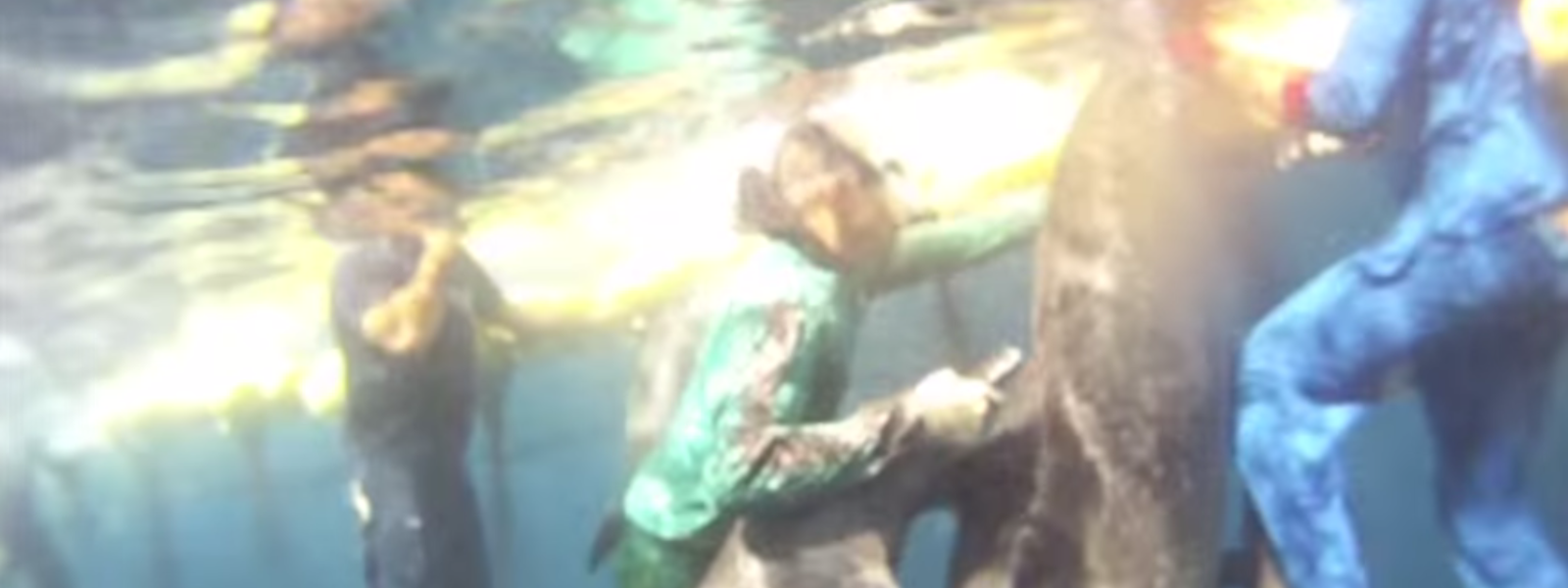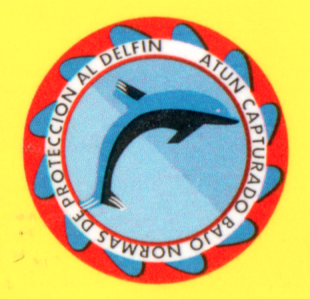

Walmart in Costa Rica offers Suli brand tuna, which is caught and canned in Mexico, for sale in stores in Costa Rica. Walmart also owns several other stores in Costa Rica that also sell Suli tuna, including Sam´s Club, Pali, Max X Menos, and Maxipali.
Suli tuna is cheaper than other tuna caught in Costa Rica and other countries, because Mexican tuna companies cannot sell their tuna widely in the US and Europe, the largest markets for canned tuna in the world. Many consumers will not buy tuna caught by chasing, harassing, netting, injuring and killing dolphins. So Mexico seeks other markets, such as the Costa Rican market, where they sell Suli brand through Walmart with a phony dolphin protection logo on it.
This is the way the Mexican tuna industry, canners of Suli brand tuna, catch tuna by deliberately targeting and netting dolphins:
Mexican vessels are equipped with extensive sonar and radar arrays, as well as large “crow’s nests” in the masts that are used to find dolphins. Most have helicopters to help the search. Dolphins, in the Eastern Tropical Pacific Ocean (ETPO), for some unknown reason, attract schools of large yellowfin tuna, who swim beneath them. Since the dolphins are air breathers, it is relatively easy for the Mexican tuna fishermen to spot them on the surface.
Once a pod of dolphins is spotted, the mothership sends out small speedboats, capable of very fast speeds, to chase the dolphins to exhaustion. A chase usually lasts from twenty to forty minutes, and can cover several miles during that time.
In addition to causing considerable physiological stress in the adult dolphins, one of the impacts of this fishing method is that baby dolphins cannot keep up with the rest of the pod.
With various studies, the US National Marine Fisheries Service has concluded that large numbers of baby dolphins go missing in dolphin pods that are routinely chased by tuna vessels.
Yet, these baby dolphins, which either starve to death or are killed by sharks, are not counted in dolphin mortality figures for the tuna fishery, because the observers are onboard the mothership and do not see the babies being left behind to perish.
When the dolphin pod is exhausted, the speedboats circle the pod to herd it together in a tight group, while the mothership catches up and deploys a mile-long purse seine net around the dolphins and tuna. The net is cinched up like a drawstring of a purse, hence the name purse seine net. Generally, the dolphins and tuna are kept corralled in the net for two hours or more.
The tuna vessel then makes a maneuver called a “back-down”, in which the end of the net away from the boat drops under the water and, often, divers enter to push the dolphins out of the net. The dolphins are not kept for anything, so it is important for the fishermen to get as many of them out as possible before closing up the net and bringing the tuna onboard.
The observer onboard the mothership is supposed to count the number of dolphins that die in the nets. Here is where this scheme gets very dubious. Under Mexican regulations developed as part of the Inter-American Tropical Tuna Commission (IATTC), tuna can be considered “Amigo del Delfin” if the observer on board does not see any dolphins die or be “seriously injured.”
There are many problems with this standard for “Amigo del Delfin” tuna. As noted, dolphins are subject to severe physiological stress and injuries, which are not observed by the observer. Dolphins may be bleeding, which will attract sharks, or suffer internal injuries, without appearing dead to observers. Female dolphins have been known to spontaneously abort fetuses under such stress. Dead dolphins may sink out of sight before the observers can see them, and sea and wind conditions can hamper sightings.
Further, observers are subject to bribes and intimidation by the tuna fishermen. American observers have reported fishermen throwing seal bombs at them to keep them back from counting dead dolphins in the nets. Others have been threatened, and at least one American observer recently disappeared from a tuna fishing vessel he was working on.
Allowing the chasing, harassing, netting, injuring and killing dolphins for tuna considered “Amigo del Delfine” as long as no dolphins are OBSERVED to die is a corrupt, unscientific, and immoral standard; we believe consumers should reject it.
For example, Suli brand tuna has a blue dolphin seal that states that the tuna is caught under “dolphin protection laws”. But whose dolphin protection laws? The weak and deceptive standard sponsored by Mexico, and rejected by more than 95% of the world canned tuna industry.

It is like claiming that Russian roulette is “safe” as long as there isn’t a bullet in the chamber. If there is a bullet, well, then it was not safe. Similarly, a tuna net set is safe for dolphins if no dolphins were observed killed. If dolphins did die, well, that net set was not Dolphin Safe.
The IATTC number of dolphins observed killed by the tuna fleet in the ETPO in 2014 (the latest number we have) was 975 dolphins. That is a lot of dolphin deaths by methods that are “under dolphin protection laws.” But it is only the tip of the iceberg. Scientists have demonstrated that in fact many thousands of dolphins are killed annually by the tuna fishery promoted by Mexico, and the reproduction of dolphins is also being severely impacted. Both of these factors contribute to the lack of recovery of the dolphin populations.
Research by the US National Marine Fisheries Service has revealed that the dolphin populations of the ETPO are failing to recover from decades of massive killing by tuna fleets.
More than 7 million dolphins are estimated to have been killed by tuna fishing on dolphin pods since the late 1950’s – the largest kill of marine mammals in history.
Suli brand tuna is caught by this dolphin-deadly method of fishing.
There are hundreds of other tuna companies that are part of Earth Island’s International Monitoring Program for Dolphin Safe Tuna. Several are based in Costa Rica. But, when consumers buy Suli brand tuna at Walmart, they are not only contributing to the killing of thousands of dolphins annually, but are also undercutting the Dolphin Safe Costa Rican companies.
We urge the people of Costa Rica not to buy Suli brand tuna from Walmart or any of Walmart’s other stores. It is stained by the blood of thousands of dolphins.
Contact Walmart Directly And Demand that It Stop Selling Dolphin-Deadly Tuna in Their Stores in Costa Rica and Latin America:
Walmart Stores USA
Address: 702 S.W. 8th Street, Bentonville, AR 72716
Phone: (800) 925-6278
Walmart Stores Costa Rica
Phone: 800-8000-722
Email: sac@wal-mart.com